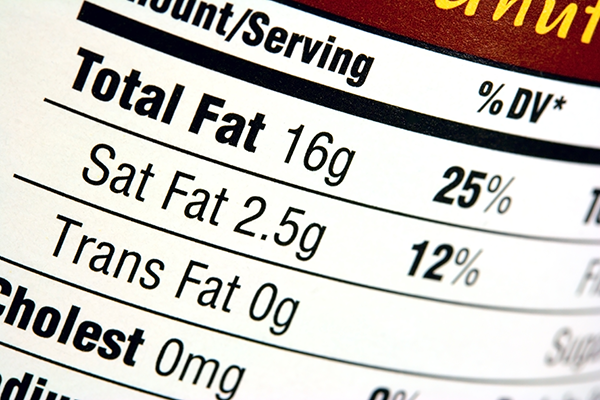Consumption of saturated fat and its impact on overall health, particularly heart disease, has become a controversial topic. It was once labeled the worst fat, but trans fat has since inherited that role.
So what does saturated fat have to do with it? Here’s what we know:
- Replacing saturated fat with unsaturated fat may have health benefits.
- Current research shows that saturated fat is better for us than trans fat.
In the world of dietary fats, saturated fats sit somewhere in the middle. So how does it fit into a healthy diet?
What is saturated fat?

Saturated fat molecules have single bonds and straight chains that can pack tightly together, like bricks in a wall. This dense packing creates a strong internal structure, resulting in a higher melting point and a solid state at room temperature.
“Saturated fats are saturated (filled) with hydrogen molecules and contain only single bonds between carbon molecules,” explains Dr. Lisa Young, a registered dietitian and adjunct professor of nutrition at New York University. “Unsaturated fats contain at least one double bond between carbon molecules. Saturated fats are solid at room temperature, while unsaturated fats, such as olive oil, tend to be liquid at room temperature.”
Saturated fat is found primarily in animal foods, such as beef, lamb, and pork, but also in high-fat dairy products, such as cream, cheese, and baked goods.
It’s back in the spotlight primarily because of the ketogenic diet, in which people limit carbohydrate intake and increase fat intake in hopes of training the body to burn fat instead of glucose (carbohydrates) for fuel and speeding up weight loss .
But not all fat is the enemy we once thought it was. For example, olive oil and avocado are very good for you.Additionally, it is worth noting that dietary fat does no Make you fat. While your body doesn’t need saturated fat, it does need some for a variety of reasons, such as vitamin absorption and other metabolic processes.
Your body needs two essential fatty acids, which are your body fat cannot Self-produced:
- alpha-linolenic acid
- Linoleic acid
These fats are found in unsaturated fats, also known as “healthy fats.”
Have attitudes toward saturated fat changed?
For decades, it has been thought that consuming saturated fats—again, imagine the lovely visual of being solid at room temperature—could clog arteries, potentially leading to heart disease, heart attacks, and strokes.
There is a lot of debate among scientists and doctors/nutritionists about just how bad saturated fat is for the body. However, this does not mean that it can be done without restraint.
“Whether saturated fat increases disease risk is currently controversial,” Yang said. “Having said that, a little is okay, but in my opinion, no more than what is recommended.”
She explains, “The Dietary Guidelines for Americans, including the Dietary Advisory Committee’s most recent report on the 2020-2025 Guidelines, recommends targeting no more than 10 percent of calories from saturated fat. The American Heart Association recommends even less.”
What does that mean:
- According to dietary guidelines, if you eat a 2,000-calorie diet per day, only 200 calories will come from saturated fat. It’s about 20 grams.
- If you need to lower your cholesterol, the American Heart Association recommends reducing your saturated fat intake to five to six percent of your daily caloric intake. No more than 100 to 120 calories (or up to 13 grams) of saturated fat.
Is saturated fat actually unhealthy?
Young says saturated fat is unhealthy, so limiting intake is recommended. “Eating foods high in saturated fat (red meat, butter, cheese) can raise blood cholesterol levels,” she says. “High levels of LDL cholesterol increase the risk of heart disease and stroke.”
Should I include saturated fat in my diet?

You’ve probably heard a lot about adding “healthy fats” to your diet. This is not the case with saturated fat.
“Healthy fats” are unsaturated fats. They have many benefits, including reducing the risk of heart disease. So instead of butter and cheese, eat fish, nuts, seeds, avocados and olive oil.
Whatever you do, don’t replace saturated fat with processed foods or simple carbohydrates. “Removing saturated fat and replacing refined carbohydrates is not healthy,” Young said. “However, choosing unsaturated fats instead of saturated fats may (potentially) improve health outcomes.”
bottom line
Although there are some controversial studies, research favors limiting dietary intake of saturated fat. This is because saturated fat may raise cholesterol levels.
You can enjoy saturated fat in moderation. As mentioned above, up to 10% of your total calories may come from saturated fat, but you should eat less if you have risk factors for heart disease.Remember, your body does not need Saturated fat, which means you don’t have to add it to your diet.
